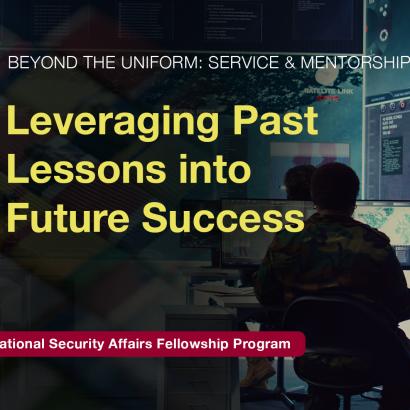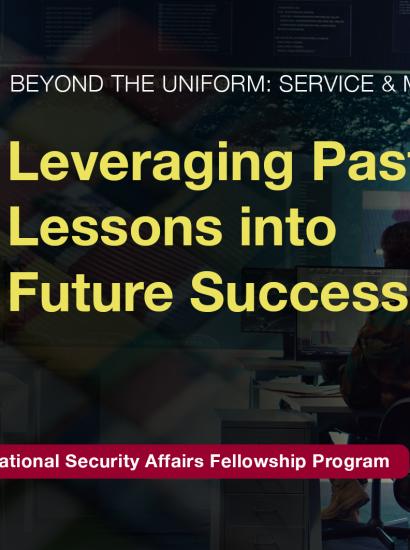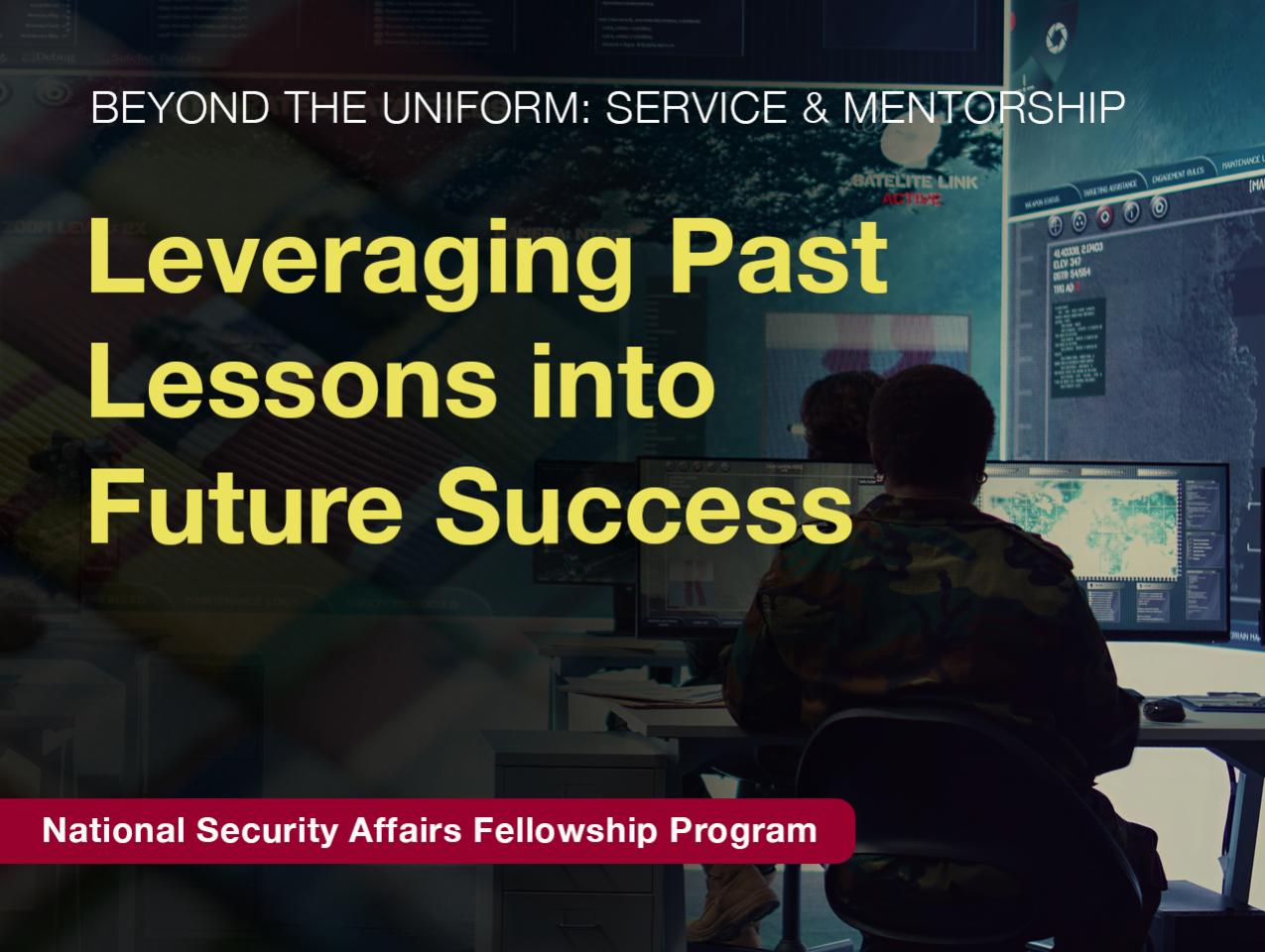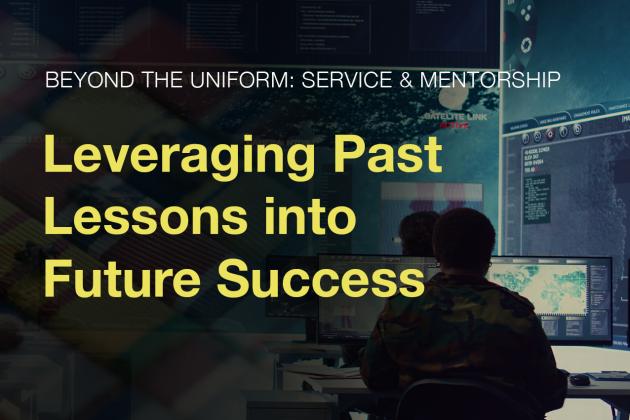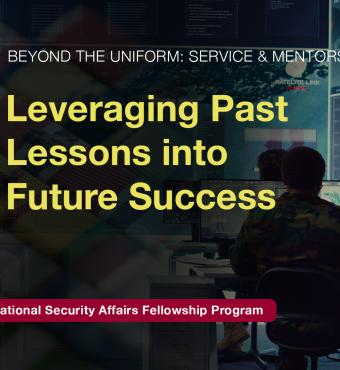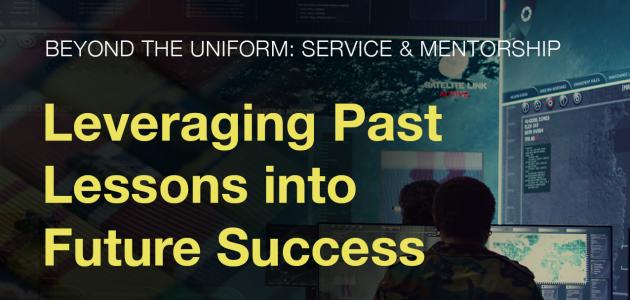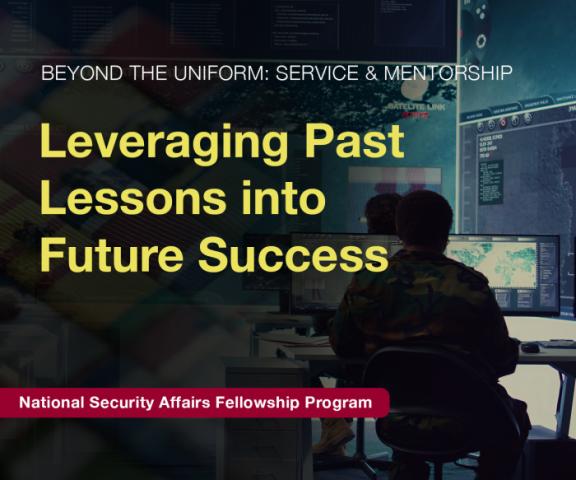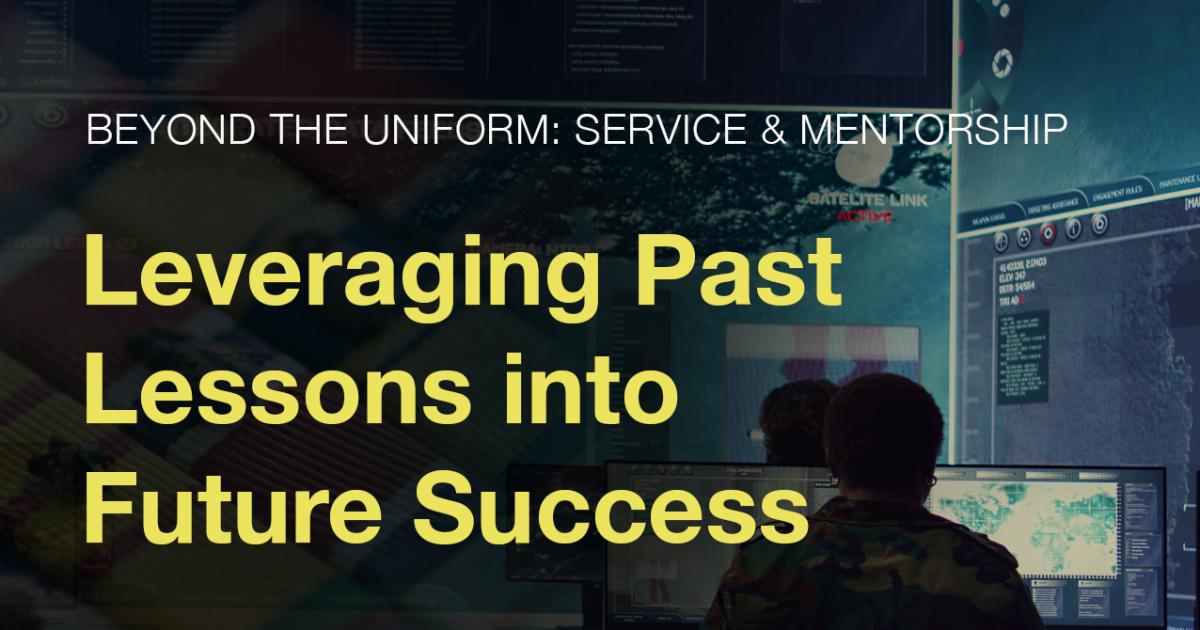Lieutenant Commander John Zhang Li (US Navy), along with Stanford University student, Anika Yadav, discusses the essential nature of past experience, even failures, to inform how to be effective and successful in the future.
WATCH THE VIDEO
>> LCDR John Zhang Li: I think the most significant challenge that students face in this age is that the geopolitical grounds are shifting beneath us. We are seeing for the first time in a long time that there's a major land war in Europe. We're seeing a resurgent China that's aggressively asserting its place in the world.
We are also seeing a lot of technological changes that's changing how war is being fought abroad. And we also can't forget that there's terrorism. That's still a big problem for students, or we should think of them more as future policymakers. The main challenge is to be able to synthesize all of the challenges I outlined and also be able to take history as a lesson and understand, synthesize, and truly adapt those lessons.
That's a tall order for anybody, but based on the promise I've seen in the students have encountered here in the program, I'm sure they can meet the challenge. There's only about 6% of the US population that have served. Most of the new military recruits join the military because they know someone in their family who has served.
As the population of veterans in the US Start to decline, the opportunities for young people to meet other people with service history is declining. And that means the military also have a hard time reaching out to the younger generation. This program really gives an opportunity for us who have served in the military to give the students a varnished view of what military service is like, both in its opportunities and challenges for the students.
You get the opportunity to meet the NCEFs, but with the collective experience of more than two centuries in public service and try to get lessons and ask all kinds of frank questions about what we have experienced and what our families have experienced. I think that's very helpful. Sure.
What I really hope to impart to the students is for you to see both the strength and diversity of our military and public service Court. I think one of the most heartwarming moments during this program is one of the students shared to me that my personal experience, going from an immigrant, the son of a political refugee, to becoming a naval officer, really fundamentally changed her view on what military service is about.
It was a truly humbling moment and also made me realize how important it is to have that deep dialogue between the younger generation and people who have served in government and military for a long time. As far as my favorite part, it's so difficult to choose. There's so many things I like about Stanford and Hoover.
Obviously, the opportunity to learn from the senior fellows is incredible. The opportunity to immerse in the cutting edge research in AI, robotics, synthetic biology on the Stanford campus is incredible. And opportunities to just have deep, frank conversation with other fellows as well as students is something that I did not expect but fully welcomed once I got here.
But out of all of those things I really appreciate from the students is how they welcome both myself and my wife into the Stanford community with open arms. We got invited to sporting events, different seminars, as well as just get togethers on and off campus. I remember we went to a synchronized swimming meet and watched the Stanford team completely dominate the competition and eventually leading them to take the national championship.
So thank you, Yara, for inviting us.
>> Anika Yadav: All the mentees, we were paired up with a mentor who we got to spend a lot of time with throughout the entire year. And what was really special is during our weekly class sessions, we would pick a topic, discuss it, and have time for deep questions and to really reflect on what the perspective is from a student from an educational standpoint, but internally from the 18 different intelligence communities as well.
And like you said, 200 years worth of military service experience all together in one room, along with all of our mentees put together, just getting to learn from those experiences were truly just so special for each of us. And the relationships that we were able to foster outside of the class sessions was probably one of the most valuable aspects of the program in itself.
The relationship we were able to develop between civilian and military and really understand what national security looks like from an internal and external standpoint. It helped us, and it helped me better understand different frameworks of viewing the issues that we face not only as a country, but also the issues that we're dealing with on a global scale.
And I think it's really valuable to have that perspective, especially as we are moving towards an era where there is increasing distrust with our government and with where we're headed as a country. There's a lot of uncertainty and being able to really understand what our officers on the front lines are dealing with was really helpful for us to have a better understanding of what's happening in the world right now and what our place is in all of that.
My mentor was Colonel Nate Garner in the US army. And I remember at the beginning of the year when I met him, the other mentees, Eddie Jayden and I, were really curious about what his experiences were like and what kind of work he had to deal with. But as the year progressed, I think what was really special is we were truly able to understand what he valued and how his values were shaped by his experiences within the U.S. army.
And that helped us understand how we are shaping our own principles and values and the way that we view the world in a unique manner. And the relationship really transformed into something that felt almost like a second family. Both his wife and him took us into their family throughout this year.
We got to spend time at dinners, going to movies together, and really understand what the day to day life looks like. But most importantly, the perspectives that are shaped by the experiences that individuals have. And he's become someone that I can count on, someone that I go to when I'm in need of guidance.
Even beyond when we were talking about our classroom discussions related to national security. I think that relationship has really blossomed into something so much deeper and so much more meaningful. And I think that's definitely something that has really shaped my perspective for what I'm going to do next.
And even in the coming years, my time here at Stanford. I think something that Colonel Garner has really taught me is to always ask how and why, rather than just who and what, the way that he approaches issues, or even the questions that we would ask him. He always taught us to think from different perspectives, but to try and apply frameworks to that thinking.
And in that manner, it really helped us with understanding how to come up with solutions for problem or how to even get closer to a solution. And that was something that I really admired about him. And even in the stories that he told us, there was so much meaning and compassion ingrained within them.
It really taught us to reflect more on what he was sharing. But also, even in the other story time sessions that we had during class, I think that part of being able to question a system or being able to ask questions when it's hard was something that was really valuable and even to understand how personal ethics matter.
But also there's an organizational responsibility that people have was something that was really valuable. I think one of the most surprising things or unexpected things that I learned was that even as NSAF mentors, even in your careers, there have been times when you've made a mistake. But the most important aspect of that has been how you took that mistake and were able to move forward from it, and how you were able to leverage the lessons that you learned from those experiences into making even better decisions going forward.
And the most valuable aspect of that has been learning from Mr. Garner and everyone else about how important it is to give yourself grace, but also to recognize that there are. You have a responsibility to the work that you're doing, and it's your job to continue progressing and growing in whatever that is.
And part of that involves embracing failures and times when you're not certain what you're doing or if what you are doing or where you are at is the right place to be or the right thing to do. Throughout this year, I've had an immense amount of takeaways and lessons that I've learned through this program and through our relationship with Colonel Garner and the other N staff mentors as well.
But I think one thing that has really stood out through every conversation that we've had, whether it be about the current state of the federal government or what's currently happening abroad in the South Pacific Sea, or Even the conflicts abroad, whether in Ukraine, it's been this grounding aspect of the way that our relationship.
We've been able to ask questions and receive true and authentic answers from our mentors. It's really allowed me to understand that the conflicts are not so far or distant from where we are. I think a lot of times we consider students and even civilians to be very distant from the issues that the country is dealing with.
But in fact we are impacted by them every day and in unexpected ways. And I think learning about that was incredibly important for us to understand as students who are hoping to engage in conversations further on related to these issues, or even to contribute in some manner to help mitigate or address the conflicts that are at hand.
I think being able to understand from an internal perspective, but also from a relational perspective of what internal military relations look like, how military families are affected by deployment, but even how families back home and communities are part of this broader movement and, and engagement that we have, I think that was something that has really stuck with me.
And even as I go on go forward through this program, I think that perspective and think that way of thinking is going to stay with me for a very long time. This program has certainly left a lasting impression on me even outside of the classroom. It's really given me a perspective on what I would be interested in, but most importantly what my role could be in national security and how I as a student could help contribute to the broader mission.
But it's also allowed me to have meaningful conversations with the other students in my life, my family members, my community members, and really even help them understand that the things that we see on media are a lot more intricate than they may seem from a third party perspective.
It's allowed me to understand that I as an individual have responsibility and there are certain things that I can do to help contribute to, to making even our nation just slightly better. And it starts with those conversations at the local level. And I think that was something that was really impactful for me, personally.
And even as I think about what I'm going to be doing next, this program has allowed me to find new opportunities as I'm going to be this summer in Alabama, working with the Air Force University's accelerator and a former NSAF fellow as well. I think truly to understand the impact that this mentorship program has had, you have to look beyond just what we have learned firsthand about national security, but most importantly, what we've learned about ourselves from each other, the different perspectives that help contribute to what we're doing.
To address national security concerns, but also the different groups and, and communities that are all involved in this bigger picture. I think that has been really impactful. I think it was interesting to learn about how the decision making process involves several layers of disagreement deliberation until a final decision is made.
I think often people don't realize how important it is for those who are making a decision to understand all the stakeholders involved in the process. And I think sometimes people don't know that we're working towards deterrence and trying to prevent a conflict before it even happens. And part of that involves understanding what the different parties in the issue value.
I think something that I thought was Was really interesting about the national security decision making process was how important of a piece that value aspect plays, whether it is in terms of the different nations and what they want out of a conflict, or even what the United States would hope for, and how the different countries and players in the issue, what role they play within that.
I think the decision making process from a value standpoint has been something that's been really interesting to learn about, but to also understand that success when it comes to a decision can be made only when you truly understand what are the needs, wants and the desires of the people that are involved and the actors at play.
When it comes to policy implementation, what I thought was most fascinating is how there can be unintended consequences or effects or an impact from a policy decision. And throughout the initial creation process to have the foresight to think ahead of what potential issues or effects might be created as a result of a policy being implemented, that was really fascinating to me.
To be able to think and question a policy framework and to ask this is what we want to do or this is what we want to accomplish, but what more could potentially happen as a result? And being able to think about that was truly unique, but also really important.
And I think that's really helped me also understand that even outside of policies, when it comes to any kind of decision making and implementing it, we need to always be aware that there may be results that we are not intending or expecting. But then how do we move forward from those and how do we address those?
I think before coming into this program, just based off my past conversations and work with veterans and what their experiences look like, I think I didn't truly understand how different the policy making process, the legislative side and the military affairs and implementation side truly were. The. I mean, learning from all of your experiences and the challenges that you've had to face and overcome internally and personally, I've realized that with the military, they're truly an extension of implementing the policies that we would benefit civilians.
They're the ones who are in the front lines, who are protecting the civilians and their interests and the interests of the United States. But the interests of the United States means the interests of Americans and the American people. And sometimes it can be hard to understand that when we think of the interests of the United States, it means the day to day civilians who go to their jobs, who live in this nation, who are a part of the communities that we are all a part of, and our military officers and those who are in service are there to protect the interests and to prevent any harm that could be caused to these civilians.
And I think that understanding the two distinct roles that are being played at hand, that has been really interesting to me. And it's helped us recognize that as civilians, we actually have a lot more authority than we may think over what decisions are being made, whether at the state or especially at the federal level, considering foreign policy.
When it comes to leadership, it reminds me of this one class we had where we were discussing about whether good leader is charismatic or not. And we had this conversation discussing how important it is to be personable and being able to be a good communicator, and whether or not that was the qualities of a good leader or decision maker.
And I think what I realized from that conversation is that a big aspect of leadership is not only this communication piece, this ability to connect with people, but it's this ability to empower people to be able to make their own decisions in a way, with guidance and the tools and the knowledge to be able to make decisions that are effective and ethical and even moral.
And it reminds me of some of the stories that we've heard about ethical dilemmas, whether on the battlefield or even internally, the challenges that you face with leadership. But most importantly, I think taking away from those stories has been that to be a truly good leader, you have to be able to consider how your decisions affect other people.
Through being in this mentorship program, I've realized that I'm really interested in national security. But even the innovation that's taking place related to even, like, the aerospace or aviation and the different tools and resources that are really beneficial to military operations. And from that perspective, I think I wouldn't have considered it until being a part of this program and realizing how important personal relationships are within the intelligence communities, but also how important innovation is to accomplishing the goals that we have when it comes to national security.
And so I think that that's really pushed me to continue to explore this area a lot more. I've started taking more classes related to aerospace, aviation and innovation regarding national security, and even understanding what role different industries play in the types of decisions that we end up making in foreign policy.
And I think going forward, I'm definitely going to be wanting to dive even deeper into this and explore this field from a new perspective of what it means to serve in the military and what it means as a civilian who. Who is now more informed about these relationships and more informed about how these decisions are actually being made.
I think I've realized that as much as the larger countrywide decisions in foreign policy seem to be made by a handful of individuals. I've realized that there are decisions being made every day within the military communities that we may not see from a civilian perspective. But those decisions are what are impacting the large scale of what ends up happening.
We may see that today a policy was passed or the United States is moving forward with a certain initiative or an act when it comes to any conflict like the Ukraine war or even what's happening in the Middle East. What we may not see is what's happening on the battlefield and what those decisions that are being made within a few moments, the impact that that has and the types of relationships that are being formed abroad.
I mean, we've heard stories of some of our mentors when they were serving in Afghanistan and how being able to foster relationships with the locals was so crucial to the overall mission. I think that has really expanded my perspective on how these operations take place. But even how we are affected every day by individuals who are going out there to serve and the values that they carry and the goodwill that they have for not only our nation, but also the benefit of the world as a whole.
I think it's definitely helped me understand that as a country we have a lot to improve on, but every day we're getting just slightly better.
>> LCDR John Zhang Li: This mentorship experience have really opened my eyes on how the younger generation think about our challenges as a nation, both within the country and abroad.
Through many sessions with the students, I was pleasantly surprised by the number of direct prodding questions that truly challenges our thinking on particular issues. And the students also follow follow up questions and to make sure that we don't get away with just with hand waving theories, but rather back up our answers with concrete facts.
And by those type of interaction really helps me personally to be able to sharpen my argument and having clearer idea of how to approach a policy decision and be able to explain it not just in layman's terms, but also defend it against well informed students and others. That has been an eye opening experience for me and I will always treasure it.
I have had a lot of interactions with students in this program and I can say from those experiences that we don't always give enough credit to the younger generation. If you look at tve, you might see downright dismissive views of Gen Z and when I was growing up we also had similar dismissive views of Millennials.
That pattern just continues. But through my interactions here with the students, I'm very optimistic about the future. Just seeing how methodical, curious and smart the students are and how they approach different problems and they always ask the right questions. So I'm very optimistic about the future. Whatever challenges that come along the way to our country, I'm sure the younger generation will be able to find solutions to them and make our country a better place.
ABOUT THE FELLOW & MENTEE
Lieutenant Commander John Li, US Navy, is a national security affairs fellow at the Hoover Institution for the 2024–25 academic year. As a surface warfare officer, he has served on various ships, including amphibious command ship, guided missile destroyer, and littoral combat ship, in roles including chief engineer, antisubmarine warfare officer, and electronic warfare officer, participating in operations across US Indo-Pacific Command, Central Command, and European Command.
Anika Yadav is a rising sophomore at Stanford University and is a consultant for the Stanford Marketing Group and director of the Business Association of Stanford Entrepreneurial Students.







